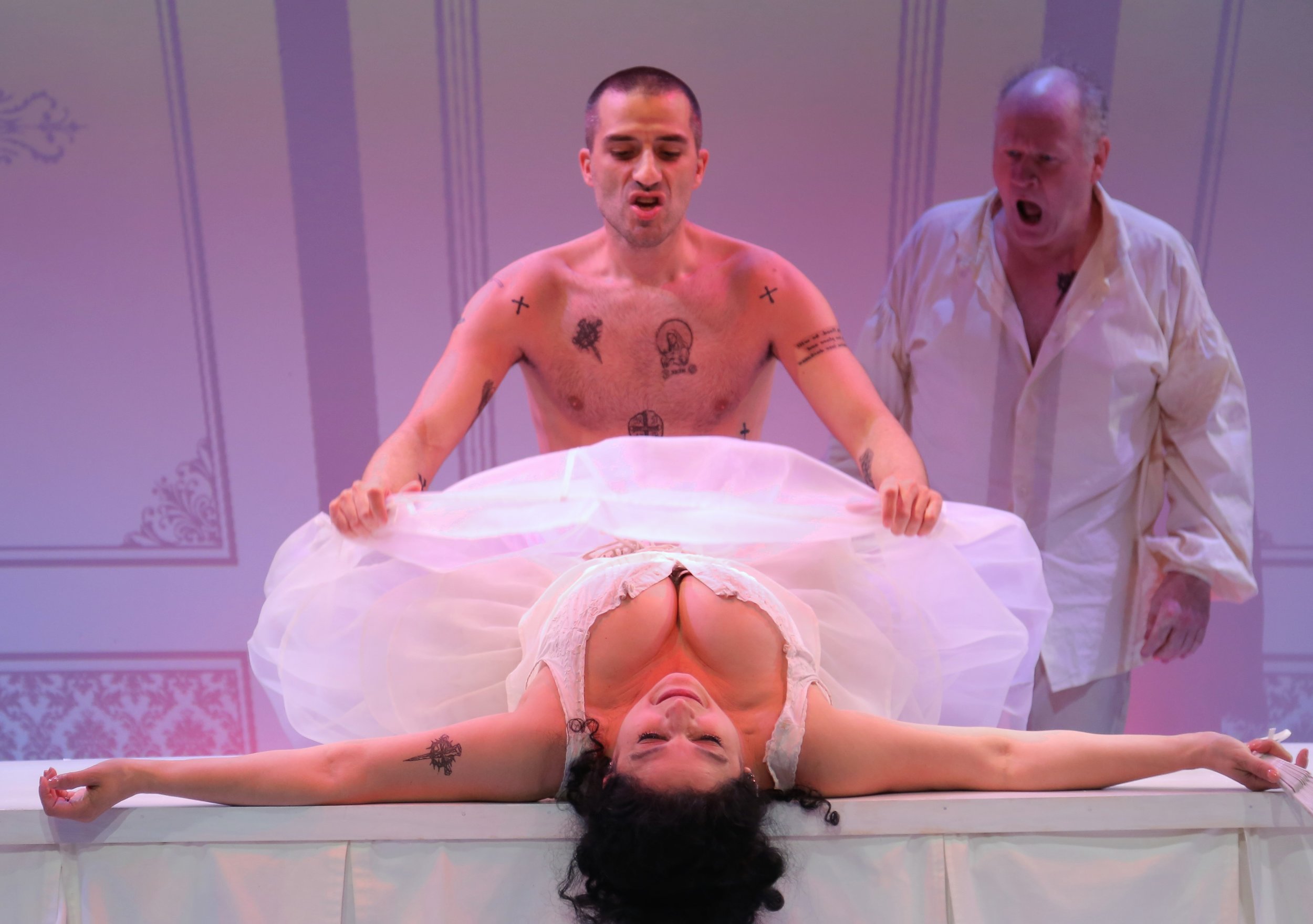Directors of Shakespeare’s plays often feel the need to goose them a bit with extraneous business, and the results can be highly variable. Yet directors tamper far less often with, say, Aeschylus, Shaw, Ibsen or Molière. It’s a bit of a surprise, therefore, to find that Craig Smith has chosen to inject a good deal of invented business into Molière’s 1669 classic Tartuffe, and that, for the most part, it works rather well.
David Ball’s adaptation keeps the verbal elegance of, yet mostly dispenses with, the rigorous rhymed couplets in the French original. He uses them on occasion: a rhyme of “gruesome” and “twosome” is wittily enlisted to refer to the astonishingly protrusive bosom of Elise Stone’s Elmire, the wife of Orgon (John Lenartz), a wealthy Parisian who has opened his home to the ascetic monk Tartuffe. Although Orgon’s scowling mother Pernelle (Eileen Glenn) also adores Tartuffe, Elmire and the rest of Orgon’s household—his son, the strapping Damis (Matt Baguth); his daughter, timorous Mariane (Alicia Marie Beatty); his level-headed brother Cléante (Ariel Estrada); and his servant Dorine (Morgan Rosse)—bridle under the insistent praises of Tartuffe and suspect the holy man of hypocrisy.
Outside the family is Valère (Wesli Spencer), who is betrothed to Mariane but who discovers that Orgon is about to renege on his blessing and insist that Mariane wed Tartuffe. Molière delays Tartuffe’s entrance quite a while, as each of the family members rails against Tartuffe or cadges Orgon to see the light.
John Lenartz is Orgon, and Alicia Marie Beatty is his daughter, Mariane, in Tartuffe, at the Wild Project. Top: Josh Tyson as Tartuffe prepares to have his way with Elise Stone as Elmire, as Orgon looks on.
Moreover, Ball has invented a new character, Laurent, a monk who shadows Tartuffe and swings his rosary beads; he echoes his master’s words almost inaudibly or serves as a parroting intermediary. (For some reason, the character’s name is spelled Laurant for this production but Laurent in Ball’s script; in the original he is unnamed and only referred to, but Smith has transferred a few lines of Tartuffe’s to him as well.) The lanky, hawk-nosed Oscar Klausner makes Laurant a brilliant comic addition to the play without violating the spirit of it.
As the title character, Josh Tyson radiates asceticism and wisely plays the part straightforwardly: he keeps one guessing just how devout he is and whether or not his enemies are right or wrong. He cantillates his lines at times, and yet shows equanimity amid all the would-be persecutors. It’s not altogether credible that he would embrace self-flagellation, as Dorine says, or that he would be covered with tattoos (a startling interpolation), but he’s pretty shifty.
At times the physical aspects of the comedy are pushed a bit too hard. When Elmire conceals Orgon so that he can overhear Tartuffe’s lust for her, the cough she uses to signal Orgon to reveal himself turns into major bronchitis, and Orgon himself slips out of his hiding place to munch on fruit, oblivious to the risk of being seen. With the cards already stacked against him and his stubborn puritanism, making the character an outright fool doesn’t really help.
One serious misstep is Klausner’s return as Laurant, dressed up to deliver the writ to Orgon that grants Tartuffe his estate. Painted in whiteface with circles of rouge on his cheeks, Laurant speaks in a hoity-toity accent that sounds like Inspector Clouseau being strangled. It throws the tenor of the comedy out of whack for the last few scenes.
Oscar Klausner (left) plays an emissary from the King, and Matt Baguth is Damis, Orgon’s son. Photographs by Gerry Goodstein.
In any case, the other actors speak the language superbly, notably Rosse’s pert servant Dorine; the help is always smarter than the master in such period comedies. Sitting on a table and swinging her legs, she’s a modern girl who is easy to relate to.
Others also seize the opportunities for physical business. Valère attacks Mariane’s ankle with relish, comically showing the carnality hidden by the sumptuous costumes of Debbi Hobson, who has employed swaths of satin, lace and brocade for them. In the second half, though, she and Smith play a coup de théâtre, as all the characters are shorn of their finery and appear in white underclothes (except for Baguth’s smoldering Damis, who wears normal white trousers and no shirt at all). Is the white an indication of their innocence in the face of hypocrisy? Is the stripping away of clothes a hint of the dispossession to come, as Tartuffe seizes the estate? Are there resonances with the modern political situation? It’s a reminder that serious matters underlie Molière’s portrait. In spite of some bumps, Smith’s production of this three-century-old comedy shows it still has juice.
The Phoenix Theatre Ensemble production of Tartuffe runs through Nov. 12 at the Wild Project (195 East 3rd St., between Avenues A and B). Evening performances are at 8 p.m. Tuesday through Saturday; matinees are at 2 p.m. Nov. 4 and 8 and at 3 p.m. Nov. 5 and 12. For tickets and information, call OvationTix at (866) 811-4111 or visit phoenixtheatreensemble.org.





